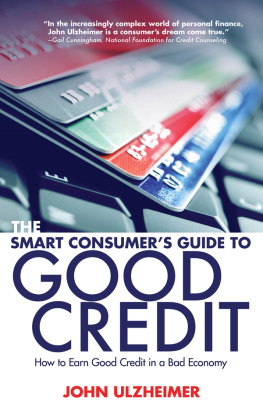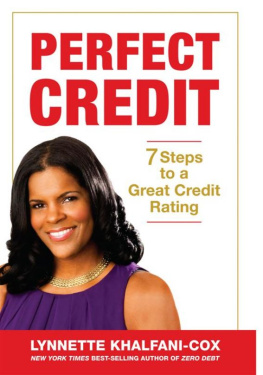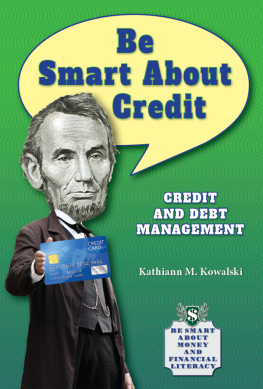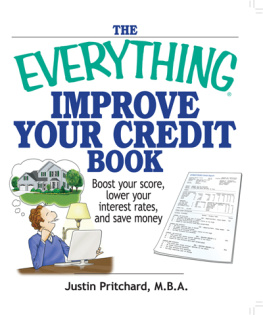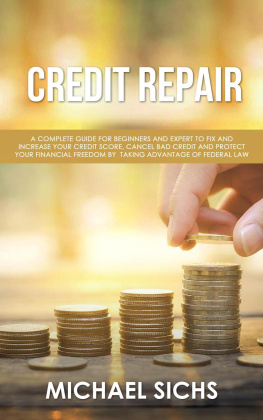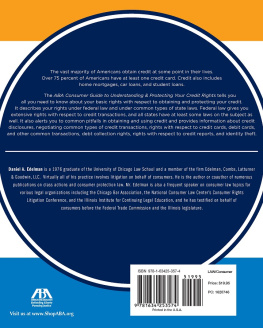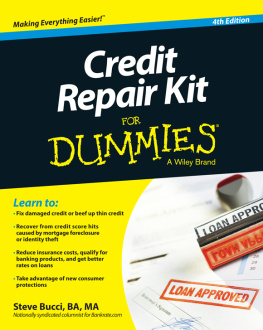2012 by John Ulzheimer and Deanna Templeton
All rights reserved. Copyright under Berne Copyright Convention, Universal Copyright Convention, and Pan American Copyright Convention. No part of this book may be reproduced, stored in a retrieval system, or transmitted in any form, or by any means, electronic, mechanical, photocopying, recording or otherwise, without the express written consent of the publisher, except in the case of brief excerpts in critical reviews or articles. All inquiries should be addressed to Allworth Press, 307 West 36th Street, 11th Floor, New York, NY 10018.
Allworth Press books may be purchased in bulk at special discounts for sales promotion, corporate gifts, fund-raising, or educational purposes. Special editions can also be created to specifications. For details, contact the Special Sales Department, Allworth Press, 307 West 36th Street, 11th Floor, New York, NY 10018 or .
15 14 13 12 11 5 4 3 2 1
Published by Allworth Press
An imprint of Skyhorse Publishing
307 West 36th Street, 11th Floor,
New York, NY 10018.
Allworth Press is a registered trademark of Skyhorse Publishing, Inc.,
a Delaware corporation.
www.allworth.com
ISBN: 978-1-58115-904-2
Library of Congress Cataloging-in-Publication Data is available on file.
Printed in Canada
Introduction:
A Note from John
Hello and welcome to my second book! I know you have countless choices when it comes to personal finance literature, and Im honored and thrilled that youve chosen The Smart Consumers Guide to Good Credit to be a part of your personal library. First, let me fill you in on my credit background.
ABOUT THE AUTHOR
I was born in Fort Rucker, Alabama, in 1968, the son of an Army officer. As with most Army brats, I moved around every few years until my family moved to Atlanta in the late 70s. My father retired, and Atlanta became home. I went to Norcross High School and graduated in 1986. I collectively spent the next five years at Georgia Southern (now Georgia Southern University), the University of Tennessee, and West Georgia College (now the University of West Georgia.)
I graduated in 1991 with a degree in Criminal Justice. In 91 the job market in Atlanta was very poor. And because my graduation predated the Internet by a good decade, I was sending out hundreds of resumes to local companies via US mail. One of the companies that responded was Equifax. I had never heard of them and I had no clue what they did. They were just on the list of companies based in Atlanta.
I was granted an interview for a customer service position. I interviewed for the job and took a required typing test. The minimum acceptable word count for the typing test was thirty words per minute. I typed twenty-nine. My contact let me take the typing test again and again, and each time: twenty-nine words. Thankfully Equifax saw fit to let me slide, and I was hired in November 1991 as a customer service representative.
I spent the next six years learning everything there was to know about consumer credit reports: where the data came from, how it was reported, how it was normalized, how it was stored, what our legal obligations for maintaining data accuracy were, how the data was packaged and sold, and how lenders used the information to make decisions. I became Fair Credit Reporting Act Certified by the credit industrys trade association, which at that time was called the Associated Credit Bureaus. I resigned from the company in November 1997 to take a position with credit scoring giant Fair Isaac (FICO).
FICO was looking for someone in their Atlanta office to help manage the companys credit bureaubased scoring models. And since I had a deep credit reporting background and a decent knowledge of credit scoring tools, we had a mutual fit. I interviewed, didnt make a fool of myself, got the offer, and started at FICO in November 1997.
I spent the next seven years developing an expertise in credit scoring: how scores are calculated, how scoring systems are designed and developed, how scoring tools are implemented and validated. I also spent a lot of time speaking with consumers and consumer groups on how to improve their credit management practices so they could improve their credit scores. I resigned from FICO at the end of 2004, yet remain very close to many at the company still today.
In 2004 I started writing credit-related newsletters and manuals for an organization that helped people recover their credit after a bankruptcy. And in 2005 I started doing contract work for Credit.com, which included content and media-related work. I always tell people that in 2005 not many media folks cared about what I had to say about credit. This has certainly changed, and since 2007 Ive been quoted and published well over 1,000 times by every mainstream media outlet you can name.
In late 2005 my career path took a strange turn, and I was asked to serve as an expert witness defending a small credit bureau in Baton Rouge, Louisiana. I enjoyed the work immensely and started to market myself as a credit expert witness, which has become a large part of my unique career path. At the end of 2011 I had been an expert witness in over 100 credit-related lawsuits and have been qualified by both federal and state courts as a credit expert. And finally, in 2011 I became Fair Credit Reporting Act Certified for a second time by the credit industrys trade association, which is now called the Consumer Data Industry Association.
When I left FICO in 2004, my goal was to give a little back to the consumer. Why? I chose that path because it was blatantly obvious that there was a need for credible and accurate credit education, or creducation as an old friend of mine calls it. And while one man certainly cant fill all of our creducation needs, one man can certainly try. And thats why I wrote this book, so enjoy.
Before you get started on the substantive portions, we need to set some ground rules. Read on...
GROUND RULES
1. My writing style has been called smart and smart-ass. I have no formal (or even informal) training as an author, which is actually a good thing, because credit is such a highly technical subject and needs a little spice.
2. I am not representing the credit industry. I am also not a consumer advocate, despite what some people have called me. I defend industry practices, a lot. And I call them out, critically, where I think theyve screwed up. I like to think of myself as an umpire simply calling balls and strikesI dont care who wins.
3. Im going to assume you have a basic understanding of consumer credit. This means Im not going to bore you with the same retreaded drivel you read in almost every other credit-related book. Im not going to explain what a credit report is. Im not going to explain what a credit score is. Thats Credit 101. This book is credit for PhD students.
4. What youre about to read is going to come across as harsh at times, but you need to read about these important topics in an unvarnished manner. Sugar coating credit-related advice is a waste of your time.
5. You shouldnt get emotional when reading this book. Why not? You shouldnt get emotional because the world of consumer credit is not based on relationships, friends, or history. Its based on a scientific and empirical evaluation of your risk as a potential borrower, and that tends to be very impersonal. Ill give you an example:
Banks are not your friends, so dont expect them to act like they are. Last year Bank of America announced that they would implement a $59 annual fee on about 5 percent of their cardholder accounts. The reaction in the blog world was swift and emotional: Outrageous! Illegal! Immoral! One reader even called them mean-spirited, yet a $59 annual fee is sixteen cents a day. Its less than you spend getting your hair done, going out to dinner, running up a bar tab, etc. In the grand scheme of things, $59 is a drop in your bucket.
Next page
